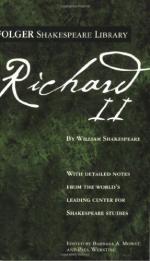|
This section contains 7,711 words (approx. 26 pages at 300 words per page) |

|
SOURCE: “The ‘Parasitical’ Counselors in Shakespeare's Richard II: A Problem in Dramatic Interpretation,” in Shakespeare Quarterly, Vol. 33, 1982, pp. 142-54.
In the following essay, Gaudet examines the discrepancy between Shakespeare's portrayal of Richard's advisors—Bushy, Bagot, and Greene—and the way the three are typically perceived (as “caterpillars of the commonwealth”). Gaudet demonstrates that Shakespeare presents the advisors as passive attendants in order to highlight Richard's own blameworthiness.
In act II, scene III of Richard II, Bolingbroke characterizes his return from exile as the advent of justice to a disrupted land. As patriotic subject, he has sworn “to weed and pluck away” the King's favorites, Bushy, Bagot, and Greene, whom he labels “caterpillars of the commonwealth.”1 Almost immediately—Bolingbroke's words are followed by a brief interlude protending disaster—we see Bolingbroke in Act III, scene i expeditiously sentencing to death two of those “caterpillars,” Bushy and Greene. Their guilt...
|
This section contains 7,711 words (approx. 26 pages at 300 words per page) |

|


